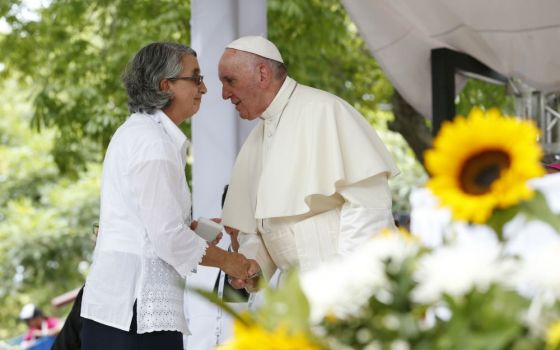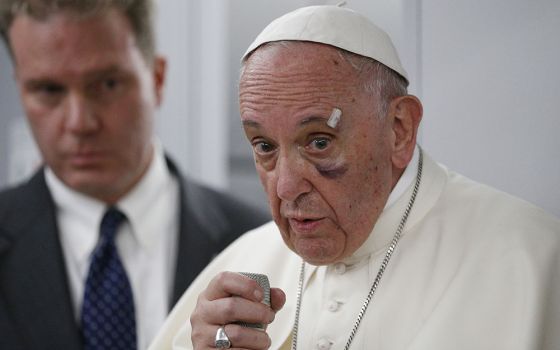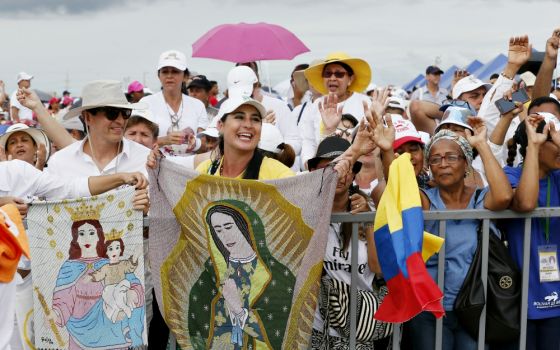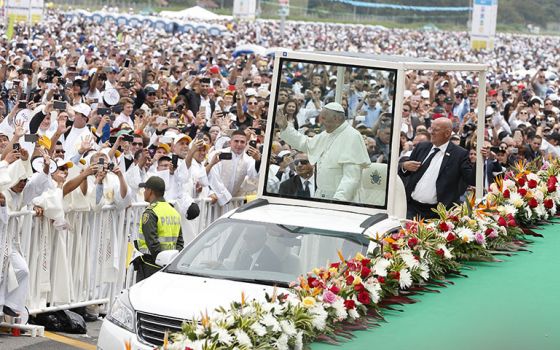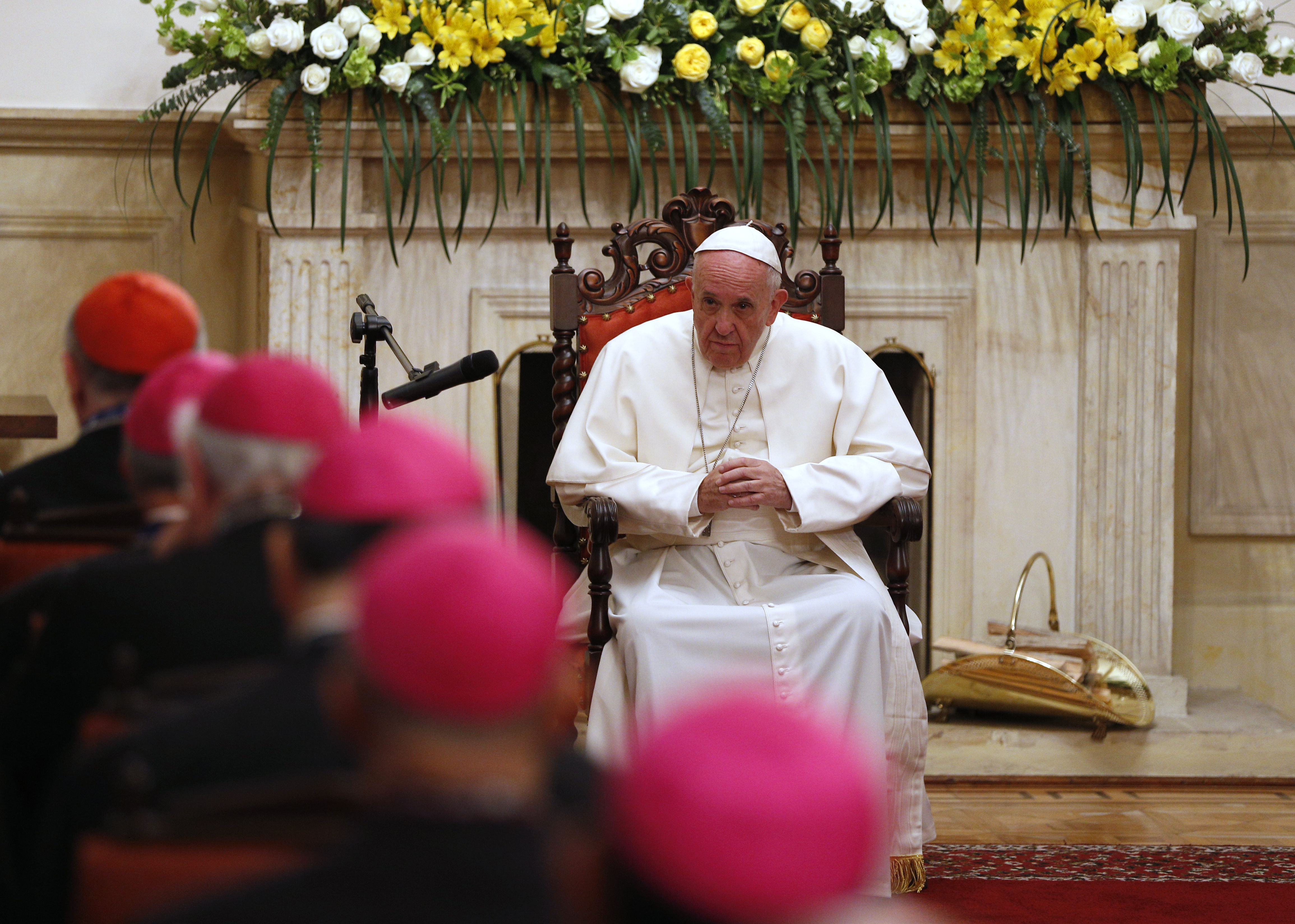
Pope Francis addresses the executive committee of the Latin American bishops' council at the apostolic nunciature in Bogotá, Colombia, Sept. 7. (CNS/Paul Haring)
Pope Francis encouraged Colombians Sept. 7 to move beyond what he termed the "corrupting darkness" of the country's 50 years of guerilla conflict, saying they live in a land of "unimaginable fertility" that can provide for the needs of everyone.
In a homily at a Mass for an estimated million people in Bogotá's Simon Bolivar Park, the pontiff said Colombians are being called to journey forward together and to work to create a unified society.
"Here, as in other places, there is a thick darkness which threatens and destroys life," said Francis, decrying a "darkness of thirst for vengeance and the hatred which stains the hands of those who would right wrongs on their own authority [and] the darkness of those who become numb to the pain of so many victims."
"In Bogotá and in Colombia a vast community journeys forward, called to conversion ... that gathers everyone into unity," said the pope.
Francis was speaking at the end of his first full day in Colombia, which he is visiting through Sunday. The papal visit comes nearly a year after the Colombian government and the rebel group FARC finalized a peace deal ending a brutal guerilla war that started in the 1960s.
It is estimated that some 220,000 were killed in the decades of fighting, and millions of others were displaced from their homes.
Following the Mass Sept. 7, Francis was expected to meet with several Venezuelans who had come to Colombia for the pope's visit, partly in order to discuss their country's continuing political crisis.
Venezuelan President Nicolas Maduro, in power since the death of Hugo Chavez in 2013, has been accused of brutal authoritarian leadership. The country has been rocked by months of protests in which dozens have died.
Two Venezuelan cardinals said the pope invited them to have a 10-minute discussion and that they wanted to call attention to the "truly desperate situation" in their country.
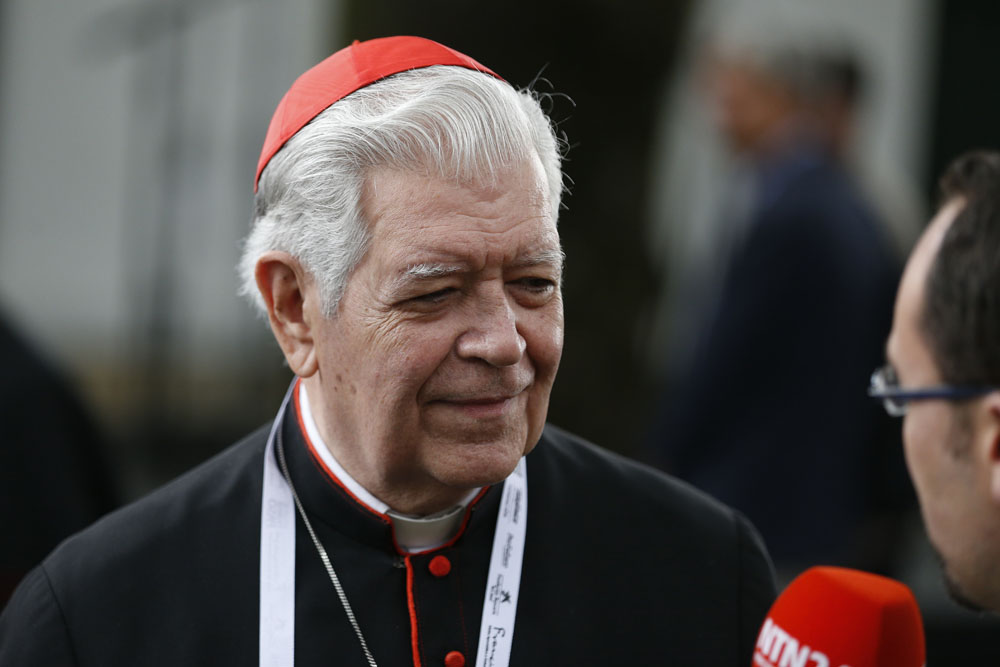
Cardinal Jorge Urosa Savino of Caracas, Venezuela, is interviewed near the apostolic nunciature prior to the start of Pope Francis' meeting with the executive committee of the Latin American bishops' council in Bogota, Colombia, Sept. 7. (CNS/Paul Haring)
"There are people who eat the garbage ... and there are people who die because there is no medicine," said Caracas Cardinal Jorge Urosa Savino. "We want to remind the pope of this again and especially the serious political situation because the government is doing everything possible to establish a state system, totalitarian and Marxist.”
Mérida Cardinal Baltazar Porras Cardozo said he thought the meeting would be "a real gift that the pope is giving to all of the Venezuelan people through the bishops who are here."
Francis was reflecting in his Sept. 7 homily on a passage from Luke's Gospel, in which Jesus encounters Simon Peter on the Lake of Gennesaret and asks him to take his boat into deeper water and lower his nets to catch fish. Simon does as Jesus asks and catches so many fish that he tears his net.
"Jesus scatters and destroys all this darkness with the command he gives to Peter in the boat: 'Put out into the deep,' " said the pontiff.
"Peter knows his weakness, his ups and downs ... as we all know our own, as is known in the history of violence and division of your people, a history which has not always found us sharing the boat," the pope told the Colombians in the crowd.
"But in the same way as Simon, Jesus invites us to put out into the deep, he prompts us to take shared risks ... to give up our fears which do not come from God, which paralyze us and prevent us becoming artisans of peace, promoters of life," he continued.
Like at earlier events in Colombia, crowds at the Mass with Francis Sept. 7 were very large. Colombian authorities estimated that 1.1 million people were present for the event.
The pontiff rode in the popemobile for nearly half an hour before the start of the liturgy, winding along paths lined with people to offer blessings and wave as many held up banners and flags.
Some people had waited for a spot to see Francis since early in the morning, huddling under ponchos and even their banners as it rained occasionally through the afternoon.
The Mass was Francis' last public event in a packed day in Bogotá in which the pope also met with Colombian President Juan Santos, spoke to the country's 130 bishops, and met with 62 members of the Latin American Episcopal Conference.
Meeting with Santos and Colombia's political leaders at the Casa de Nariño presidential palace in the morning, Francis asked them to have the determination to "flee from the temptation to vengeance" after the war.
Advertisement
In his address to the Latin American Episcopal Conference, commonly known by its Spanish acronym CELAM, the pontiff said that their region of the world has a special ability to show the power of hope to the world.
"Many people decry a certain deficit of hope in today’s Latin America," said Francis. "We cannot take part in their 'moaning,' because we possess a hope from on high."
"Once you think hope is gone, it returns where you least expect it," the pope continued. "Our people have learned that no disappointment can crush it. It follows Christ in his meekness, even under the scourge. It knows how to rest and wait for the dawn, trusting in victory, because — deep down — it knows that it does not belong completely to this world."
"The church in these lands is, without a doubt and in a special way, a sacrament of hope," Francis told the 62 members of CELAM, a regional bishops' conference that represents the 22 Latin American and Caribbean countries.
Francis is to continue his visit in Colombia Sept. 8 with a visit to Villavicencio, about 75 miles southeast of Bogotá. He is to visit Medellin Sept. 9 and Cartagena Sept. 10 before returning to Rome.
[Joshua J. McElwee is NCR Vatican correspondent. His email address is jmcelwee@ncronline.org. Follow him on Twitter: @joshjmac.]






